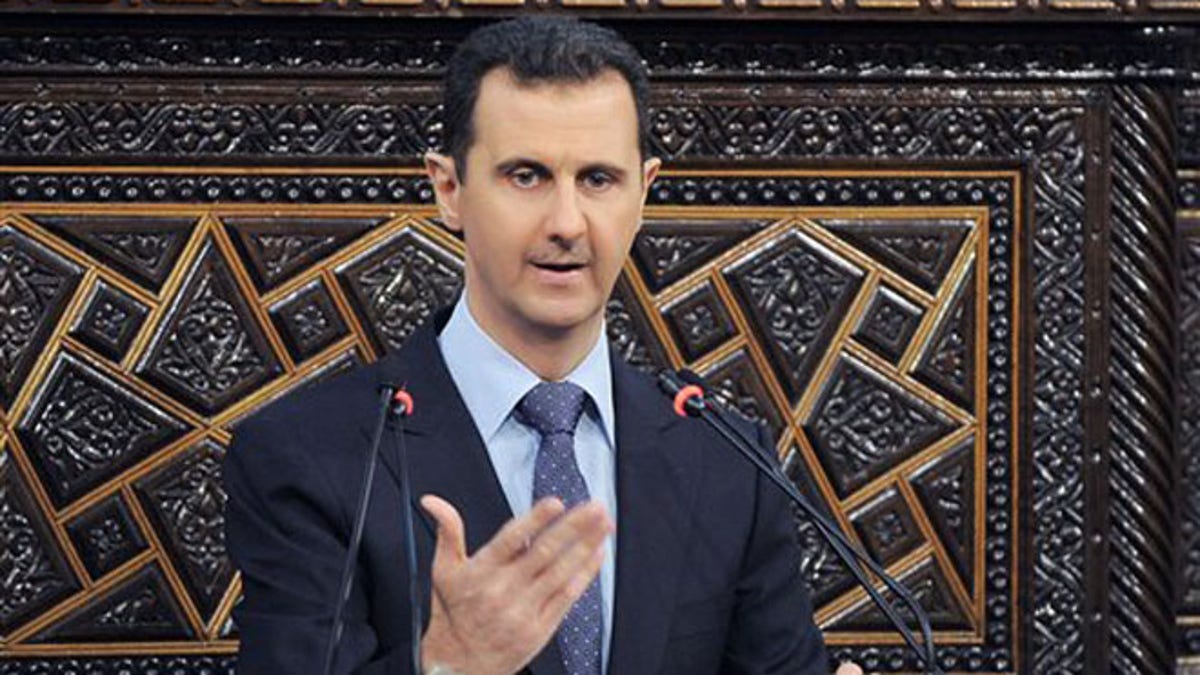
June 3, 2012: In a much-anticipated speech, embattled Syrian president Bashar al-Assad blames foreign powers and "terrorists" for the violence that has wracked the country for the last 15 months. (AP) (AP2012)
HAIFA, Israel – As Syria's regime teeters on the brink of collapse, Israeli soldiers and civilians alike are preparing for possible military action to make sure Bashar al-Assad's chemical weapons don't fall into the hands of terrorist groups.
Sources close to the Israel Defense Force told FoxNews.com soldiers have been put on standby and are ready to move, while civilian demand for gas masks has jumped 66 percent over the last few weeks from 2,200 to 3,700 per day. The fears center around the prospect of Hezbollah getting Syrian chemical weapons as the Assad regime shows imminent signs of collapse.
“Israel...will not hold back and will respond decisively if this happens,” Israeli Foreign Minister Avigdor Lieberman said.
[pullquote]
Hezbollah, (the Islamic militant group based in south Lebanon, supported by both Syria and Iran), who has long called for the destruction of Israel, is the prime candidate to take possession of the armaments. Speculation is mounting about when and how Israel will deal with the prospect of chemical weapons being spirited away during the chaos of Assad's likely fall.
“It appears the IDF may seek to eliminate Syria’s ability to transport the weapons to proxy forces but not to eliminate the actual weapons themselves by striking at storage facilities," Idan Kweller, political correspondent for Israel Army Radio, told FoxNews.com. "Israel’s main interest is to ensure the weapons are not passed on to the likes of Hezbollah in south Lebanon.”
The potential breakdown of the Syrian regime has reportedly paved the way for any number of Islamist terror groups, including Al Qaeda, to blend in with the Free Syrian Army, giving them cover to get at the a chemical weapons stockpile Assad acknowledges having. That could potentially pose a massive threat to Israel’s security and inflict significant civilian casualties, according to experts.
Meanwhile, the race to locate the chemical weapons has reportedly been taxing a number of international security agencies, including the CIA, desperate to ensure the arms won’t fall into the wrong hands and spark an all-out regional war. One report suggested that a group of Jordanian commandoes had been sent into Syria to try and recover the weapons, while Turkey’s intelligence agency is another with good reason to fear unaccounted for weapons.
Earlier this week, Turkey, nervous of growing activity from Kurds in western Syria, mobilized troops and missile batteries to the border, further ratcheting up tensions in the region against their former ally. Earlier on Thursday, Turkish newspaper Zalman reported officials speaking optimistically of Turkey’s “commitment to preserving warm relations with Israel,” a significant change in tone from the antagonistic relationship on both sides in recent years and a follow on from the up-beat visit of a Turkish delegation to Jerusalem who met with Israeli Prime Minister Bibi Netanyahu a day earlier.
Kweller believes Israel and Turkey could well be on the verge of setting aside recent disputes to jointly focus on the danger a de-stabilized Syria poses them both.
With increased reconnaissance of the region set to dictate the next move, the Israeli public is holding its breath to see exactly what Netanyahu and his advisors will do next. They may hold back until the last possible moment in an effort to be seen as doing everything to keep the lid on the region, or they could move proactively. The IDF and the public don't know yet, but their jitters are real.
Paul Alster is an Israel-based broadcast journalist who blogs at www.paulalster.com








































